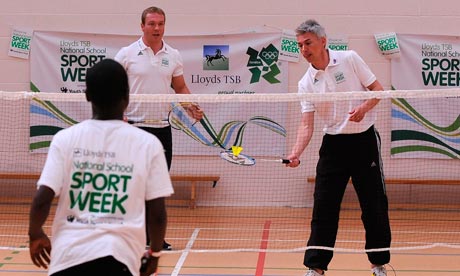
Jonathan Edwards, the Olympic gold medallist triple jumper, has called on the government to make sport as much of a priority as maths and English if the legacy benefits of the 2012 Games are to be realised.
The government was forced into a U-turn in December last year over plans to slash the £162m budget of the Youth Sport Trust, which opponents said would have devastating consequences for school sport.
Funding – albeit at a lower level – was found to keep the trust going, and plans unveiled for a new inter- and intra-school competition that will culminate in finals at the Olympic stadium.
But Edwards, who now sits on the board of the London 2012 organising committee, said the government needed to go further to ensure that all schools took sport as seriously as other academic subjects.
"The biggest single change you could make to ensure a sporting legacy would be to make physical activity as much a part of the curriculum as maths and English. The value of sport is not in finding an Olympic champion, but in the benefits of health and wellbeing," said Edwards, speaking at the launch of the Lloyds TSB National School Sport Week, which involves more than 4 million schoolchildren.
"School sport has to be at the heart of it. If you're going to have an impact on young people's lives, you have to get it right in school. The majority of them are not just going to pitch up at a club unless their parents push them to," said Edwards, who is also deputy chair of the London 2012 countries and regions group.
"I can understand the focus of education being much more decentralised and people making local decisions. I can see why you would go down that route. But you have to have some key metrics, which you have academically but don't have within sport," added Edwards, who won a gold in the Sydney Olympics in 2000.
The education secretary, Michael Gove, has announced plans for a new English baccalaureate, which pupils will qualify for if they obtain five A to C grades in maths, English, science, a foreign language and a humanities subject. But there are fears that subjects not included within it will suffer.
Following a concerted campaign by schoolchildren, athletes and opposition MPs, David Cameron announced funding would be found to maintain the Youth Sport Trust's network.
But 450 Youth Sport Trust co-ordinators on five-day week contracts will be made redundant on 31 August, and must decide whether to re-apply for new three-day week positions.
And funding that is currently provided to release PE teachers for two days a week to work with other schools in the area will be replaced by cash to allow each secondary school to release a teacher one day a week to work with primary schools.
"The entire drive behind the modern Olympic movement with [Pierre] de Coubertin began with his desire to integrate education and sport. The Olympic Games was, for him, a means to creating healthier, more vibrant young people," said Edwards.
Inspiring more young people to play sport was a key element of the pitch made by Lord Coe to the International Olympic Committee in 2005 that helped secure the Games for London.
Since then debate has raged over whether successive governments have put in place policies that will deliver on youth participation, as well as broader hopes that the Games would drive an upturn in sports participation among the population at large.

